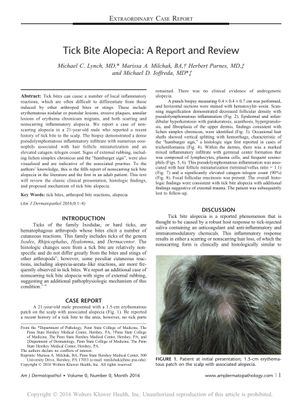Tick Bite Alopecia: A Report and Review
April 2016
in “
The American Journal of Dermatopathology
”

TLDR A tick bite caused temporary hair loss in a man, which is a rare condition that usually gets better within 3 months.
The document described a case of nonscarring alopecia in a 21-year-old male after a tick bite, marking the first reported case in an adult and the fifth overall. The patient had an erythematous patch on the scalp and hair loss, with no tick remnants. A biopsy showed a dense inflammatory response with eosinophils, hair follicle miniaturization, and a high catagen-telogen count, all indicative of tick bite alopecia. Additionally, signs of itching and scratching were present. This type of alopecia is believed to be a reaction to tick saliva and possibly exacerbated by scratching. It is generally temporary, with hair typically regrowing within 3 months, though it can last longer. Histologically, it features a dense perifollicular infiltrate, smaller hair follicles, and increased catagen and telogen phases. Recognizing tick bite-related skin conditions is crucial for correct diagnosis and management.





